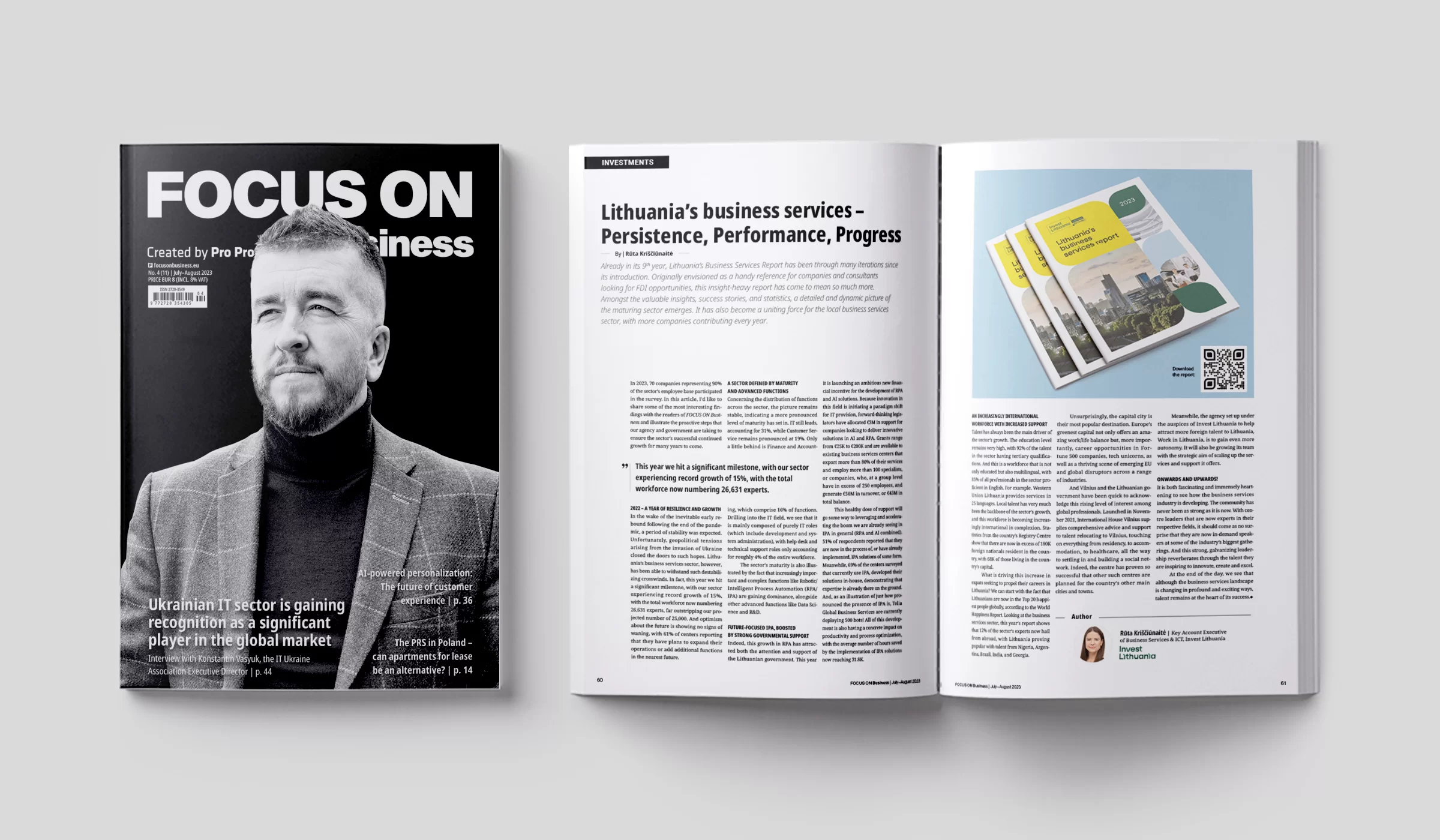The article first appeared in Focus on Business magazine.
Already in its 9th year, Lithuania’s Business Services Report has been through many iterations since its introduction. Originally envisioned as a handy reference for companies and consultants looking for FDI opportunities, this insight-heavy report has come to mean so much more. Amongst the valuable insights, success stories, and statistics, a detailed and dynamic picture of our maturing sector emerges. It has also become a uniting force for our local business services sector, with more companies contributing every year. In 2023, 70 companies representing 90% of the sector’s employee base participated in the survey. In this article, I’d like to share some of the most interesting findings with the readers of Focus on Business and illustrate the proactive steps that our agency and government are taking to ensure the sector’s successful continued growth for many years to come.
2022 – a year of resilience and growth
In the wake of the inevitable early rebound following the end of the pandemic, a period of stability was expected. Unfortunately, geopolitical tensions arising from the invasion of Ukraine closed the doors to such hopes. Lithuania’s business services sector, however, has been able to withstand such destabilizing crosswinds. In fact, this year we hit a significant milestone, with our sector experiencing record growth of 15%, with the total workforce now numbering 26,631 experts, far outstripping our projected number of 25,000. And optimism about the future is showing no signs of waning, with 61% of centers reporting that they have plans to expand their operations or add additional functions in the nearest future.
A sector defined by maturity and advanced functions
Concerning the distribution of functions across the sector, the picture remains stable, indicating a more pronounced level of maturity has set in. IT still leads, accounting for 31%, while Customer Service remains pronounced at 19%. Only a little behind is Finance and Accounting, which comprise 16% of functions. Drilling into the IT field, we see that it is mainly composed of purely IT roles (which include development and system administration), with help desk and technical support roles only accounting for roughly 4% of the entire workforce.
The sector’s maturity is also illustrated by the fact that increasingly important and complex functions like Robotic/Intelligent Process Automation (RPA/IPA) are gaining dominance, alongside other advanced functions like Data Science and R&D.
Future-focused IPA, boosted by strong governmental support
Indeed, this growth in RPA has attracted both the attention and support of the Lithuanian government. This year it is launching an ambitious new financial incentive for the development of RPA and AI solutions. Because innovation in this field is initiating a paradigm shift for IT provision, forward-thinking legislators have allocated €3M in support for companies looking to deliver innovative solutions in AI and RPA. Grants range from €25K to €200K and are available to existing business services centers that export more than 80% of their services and employ more than 100 specialists, or companies, who, at a group level have in excess of 250 employees, and generate €50M in turnover, or €43M in total balance.
This healthy dose of support will go some way to leveraging and accelerating the boom we are already seeing in IPA in general (RPA and AI combined). 51% of respondents reported that they are now in the process of, or have already implemented, IPA solutions of some form. Meanwhile, 69% of the centers surveyed that currently use IPA, developed their solutions in-house, demonstrating that expertise is already there on the ground. And, as an illustration of just how pronounced the presence of IPA is, Telia Global Business Services are currently deploying 500 bots! All of this development is also having a concrete impact on productivity and process optimization, with the average number of hours saved by the implementation of IPA solutions now reaching 31.8K.
An increasingly international workforce with increased support
Talent has always been the main driver of the sector’s growth. The education level remains very high, with 92% of the talent in the sector having tertiary qualifications. And this is a workforce that is not only educated but also multilingual, with 85% of all professionals in the sector proficient in English. For example, Western Union Lithuania provides services in 25 languages. Local talent has very much been the backbone of the sector’s growth, and this workforce is becoming increasingly international in complexion. Statistics from the country’s Registry Centre show that there are now in excess of 180K foreign nationals resident in the country, with 68K of those living in the country’s capital.
What is driving this increase in expats seeking to propel their careers in Lithuania? We can start with the fact that Lithuanians are now in the Top 20 happiest people globally, according to the World Happiness Report. Looking at the business services sector, this year’s report shows that 12% of the sector’s experts now hail from abroad, with Lithuania proving popular with talent from Nigeria, Argentina, Brazil, India, and Georgia.
Unsurprisingly, the capital city is their most popular destination. Europe’s greenest capital not only offers an amazing work/life balance but, more importantly, career opportunities in Fortune 500 companies, tech unicorns, as well as a thriving scene of emerging EU and global disruptors across a range of industries.
And Vilnius and the Lithuanian government have been quick to acknowledge this rising level of interest among global professionals. Launched in November 2021, International House Vilnius supplies comprehensive advice and support to talent relocating to Vilnius, touching on everything from residency, to accommodation, to healthcare, all the way to settling in and building a social network. Indeed, the centre has proven so successful that other such centres are planned for the country’s other main cities and towns.
Meanwhile, the agency set up under the auspices of Invest Lithuania to help attract more foreign talent to Lithuania, Work in Lithuania, is to gain even more autonomy. It will also be growing its team with the strategic aim of scaling up the services and support it offers.
Onwards and upwards!
It is both fascinating and immensely heartening to see how the business services industry is developing. The community has never been as strong as it is now. With centre leaders that are now experts in their respective fields, it should come as no surprise that they are now in-demand speakers at some of the industry’s biggest gatherings. And this strong, galvanizing leadership reverberates through the talent they are inspiring to innovate, create and excel. At the end of the day, we see that although the business services landscape is changing in profound and exciting ways, talent remains at the heart of its success.













